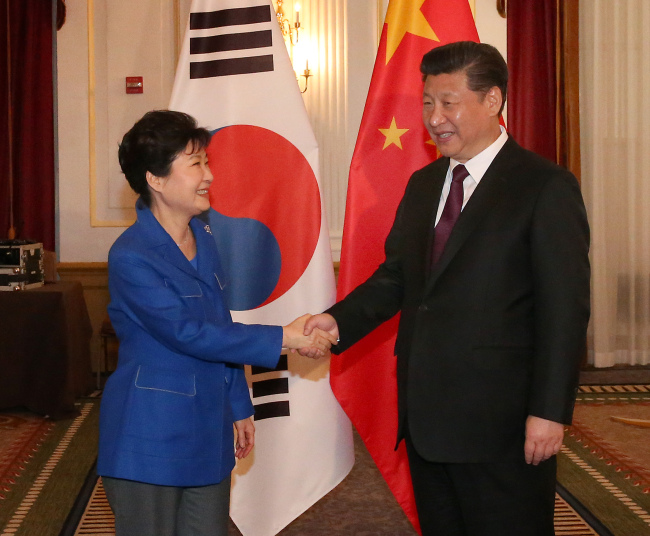President Park Geun-hye will visit and hold summits with her Russian and Chinese counterparts starting Friday as Seoul seeks to defuse tension with the two countries over its plan to station advanced US missile defense assets here, Cheong Wa Dae said Thursday.
Park is scheduled to land in Vladivostok for a two-day stay during which she will deliver a keynote speech at the Eastern Economic Forum and hold a summit with her Russian counterpart Vladimir Putin.
From Sunday, she is expected to attend the Group of 20 conference in the southeastern Chinese city of Hangzhou and swap views with other world leaders on its theme, “Toward an Innovative, Invigorated, Interconnected and Inclusive World.”
On the summit’s sidelines, Park will have one-on-one talks with Chinese President Xi Jinping.
 |
President Park Geun-hye shakes hands with Chinese counterpart Xi Jinping during their summit talks on the sideline of the fourth Nuclear Security Summit in Washington on March 31. (Yonhap) |
The trip to the two nations could provide a venue for Park to attempt to ease tension that has been deepening since South Korea announced in early July its decision to install the US’ Terminal High Altitude Area Defense.
Beijing and Moscow have strongly protested the deployment which they say constitutes Seoul’s de facto joining of the Washington-led global Missile Defense regime targeting them. South Korea argues the decision was inevitable to better counter the North’s evolving missile threats.
In a move to smooth out differences before the summit with Xi, Vice Foreign Minister Lim Sung-nam traveled to Beijing on Wednesday and met with his counterpart Liu Zhenmin. They consulted on the overall preparations for Park’s journey and the THAAD issue, among others, Seoul’s Foreign Ministry spokesperson Cho June-hyuck told reporters.
Lim’s two-day visit came amid surfacing signs that the THAAD confrontation may shake the international community’s united front against Pyongyang’s nuclear and missile program.
After the communist state test-fired intermediate ballistic missiles last month, the US-led efforts at the UN Security Council had failed to issue criticism against it, as China insisted on addressing the THAAD issue in a proposed statement.
“Being the host nation, China will try to show hospitality to the visiting Park for the moment and possibly to manage relations,” a Seoul official said, requesting anonymity due to the sensitivity of the matter.
“Given its firm stance against THAAD, however, the issue should unavoidably be brought up, and it would take time to ease the differences between the sides, which requires our further efforts to convince China.”
Before returning home on Sept. 9, Park will also participate in the ASEAN and East Asia Summits in Vientiane, Laos, slated for Sept. 7-8.
During the events, she is predicted to send a strong warning to North Korea together with US President Barack Obama and Japanese Prime Minister Shinzo Abe as it continues its nuclear and missile provocations including a recent test of a submarine-launched ballistic missile.
Park and Obama plan to meet on the margins of the ASEAN summit, while Obama and Xi are also scheduled for talks during the G-20 forum.
In line with the recent UNSC press statement, the EAS will also reflect its condemnation over the latest SLBM launch in its chairman’s statement to be introduced at the end of the meeting, Seoul officials said.
“We’re under the grave situation in which the North continues to commit provocations in flagrant and habitual violation of UNSC resolutions, even expressing its determination to press ahead with a fifth nuclear test,” the spokesperson Cho said at a news briefing.
“Our government believes it is critical for the world community to display a robust and united resolve not to accept North Korean nuclear weapons at the EAS, for which we’re in close cooperation with related countries.”
Seoul and Tokyo are currently “in final consultations” to set a separate meeting between Park and Abe, senior presidential foreign affairs secretary Kim Kyou-hyun said.
If it takes place, they will likely review the recent progress on the settlement over Japan’s sexual enslavement of Korean women during its 1910-45 rule. Tokyo on Thursday completed the transfer of the 1 billion yen ($10 million) pledged for a Seoul-based fund for the victims.
By Shin Hyon-hee(
heeshin@heraldcorp.com)








